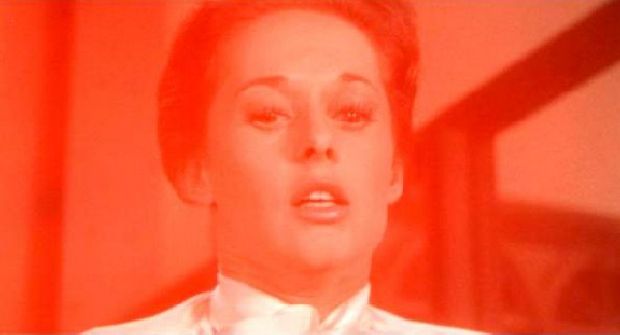Marnie (1964) 
“Only Alfred Hitchcock could have created so suspenseful a sex mystery!”

Director: Alfred Hitchcock
Cast: Tippi Hedren, Sean Connery, Martin Gabel
Synopsis: Mark marries Marnie although she is a habitual thief and has serious psychological problems, and tries to help her confront and resolve them.
All winning runs must come to an end sooner or later, and after making four bona-fide classics in a row (Vertigo, North by Northwest, Psycho and The Birds) Alfred Hitchcock finally struck out with his psychological thriller, Marnie. Although it was a moderate success at the box office, Marnie found little favour with critics of the time — although it appears to be undergoing something of a reassessment lately. It was adapted from a Winston Graham novel, but is reminiscent of Vertigo in the way it explores the sexual repercussions of the obsessive/compulsive behaviour of its key protagonist which is the result of traumatic episodes from their past. On a more superficial level, the musical score composed by Bernard Hermann — who also wrote the music for Vertigo — is very similar to that movie’s score. Unfortunately, while Marnie has much to admire and was undeserving of the critical lambasting it received in 1964, it’s certainly not on a par with Vertigo.
Marnie is played by Tippi Hedren, a typically cool Hitchcock blonde with whom he had worked on his previous film, The Birds. In fact, Hitchcock was grooming Hedren to be the next Grace Kelly until they fell out during filming of this movie. Marnie is a thief who assumes fake identities under which she robs from the safes of the companies that employ her as a payroll clerk. A major client of one of these companies is Mark Rutland (Sean Connery — The Anderson Tapes, Indiana Jones and the Last Crusade) who later recognises Marnie when she applies for a job with his own company — a job which he ensures she wins. Mark is in no doubt who the culprit is when the company safe is cleared out, and after obtaining the evidence to back up his theory he blackmails Marnie into marrying him. However, he failed to appreciate just how much of a sick pup Marnie really is, and only finds out on the first night of their honeymoon cruise when she shrieks like the Bride of Frankenstein the moment he goes near her.
Mark is the type of Alpha Male who’s more commonly found striding purposefully across the pages of some Mills and Boon bodice ripper than in a Hitchcock movie, so having forced a woman into marrying him he’ll be damned if he isn’t going to claim what’s wrongfully his. It has to be said, you won’t see a more polite rape scene in a movie than the one in Marnie, but the experience is clearly awful enough for her to attempt suicide in the cruise liner’s swimming pool. This prompts Mark, who’s a keen zoologist, into finding out exactly what’s behind his new wife’s frigidity.
Of course, there’s a reason that rape scene is so polite, and it’s that Hitchcock can’t afford to have the audience turning against his hero because of a scene which must be shown because it’s pivotal to the plot. Hitch does succeed in avoiding turning the audience against his leading man, but in doing so he severely weakens the credibility of the story he’s telling. The more you think about that rape scene and its consequences, the shakier the whole plot becomes, and the fact that Marnie chooses to attempt suicide in a swimming pool rather than jumping into the sea — a point which Mark himself raises — sort of shoots a hole in this overpowering revulsion Marnie’s supposed to have about the touch of men. I don’t even think it’s possible to commit suicide by drowning when safety is within easy reach unless you’ve first rendered yourself incapable of saving yourself, which Marnie clearly hadn’t. And that rape would surely have reinforced Marnie’s revulsion of all men, and Mark in particular, yet suicide attempt notwithstanding, she appears remarkably unmoved by it all.
It’s perhaps unsurprising that all of Marnie’s psychological problems are linked to her subconscious repression of a traumatic episode from her childhood, but it’s typical of the era in which this movie was made that all that is needed is for Marnie to be cured is for her to recall those memories. To be fair, Hitchcock doesn’t have Marnie swooning in Mark’s arms following the revelatory moment, but neither does he suggest that long months, or even years, of treatment probably lie ahead before she’ll be capable of having a normal sexual relationship. This simplistic approach to a deeply complex problem was no doubt considered fairly sophisticated for its time, but it dates the film badly when viewed today.
Having said that, Marnie is a reasonably entertaining movie in which Hitchcock demonstrated that he hadn’t lost his touch even though this movie comes nowhere near his best. His preference for favouring sound stages over shooting outside proves a real weakness here, particularly during Marnie’s frequent horse-riding scenes and on a truly bad Baltimore street scene. Sean Connery makes a confident leading man and succeeds in keeping the audience on his side as he carries out some fairly unsympathetic deeds. In fact, Mark Rutland is himself the victim of some deep-seated compulsions, not least of which is the need to control those around him, but he’s afforded the power and status necessary for these traits to be socially acceptable which is, of course, a status that is denied Marnie. Hedren, whose performance was panned by critics when Marnie was first released, is remarkably good in the title role, and looking at the subsequent parts she played you get the feeling that she never realised her full potential as an actress.
(Reviewed 18th April 2014)
httpv://www.youtube.com/watch?v=U43vWddULfI
